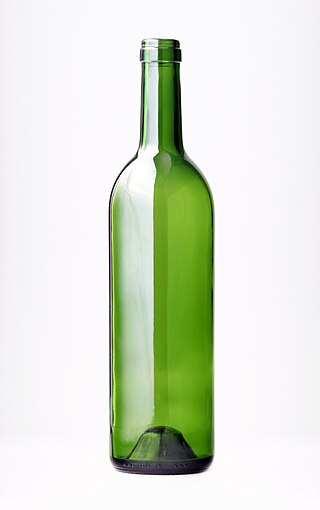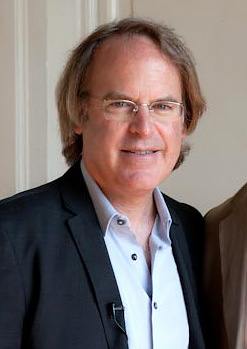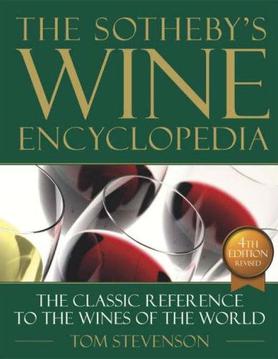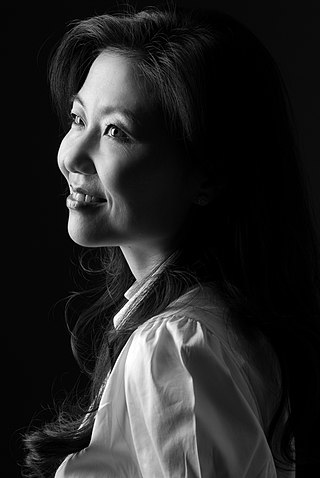Related Research Articles

Beer is an alcoholic beverage produced by the brewing and fermentation of starches from cereal grains—most commonly malted barley, although wheat, maize (corn), rice, and oats are also used. The fermentation of the starch sugars in the wort produces ethanol and carbonation in the beer. Beer is one of the oldest alcoholic drinks in the world, the most widely consumed, and the third most popular drink after water and tea. Most modern beer is brewed with hops, which add bitterness and other flavours and act as a natural preservative and stabilising agent. Other flavouring agents, such as gruit, herbs, or fruits, may be included or used instead of hops. In commercial brewing, natural carbonation is often replaced with forced carbonation.

Sir Ahmed Salman Rushdie is an Indian-born British-American novelist. His work often combines magic realism with historical fiction and primarily deals with connections, disruptions, and migrations between Eastern and Western civilizations, typically set on the Indian subcontinent. Rushdie's second novel, Midnight's Children (1981), won the Booker Prize in 1981 and was deemed to be "the best novel of all winners" on two occasions, marking the 25th and the 40th anniversary of the prize.

A bottle is a narrow-necked container made of an impermeable material in various shapes and sizes that stores and transports liquids. Its mouth, at the bottling line, can be sealed with an internal stopper, an external bottle cap, a closure, or induction sealing.

The Satanic Verses is the fourth novel from the Indian-British writer Salman Rushdie. First published in September 1988, the book was inspired by the life of the Islamic prophet Muhammad. As with his previous books, Rushdie used magical realism and relied on contemporary events and people to create his characters. The title refers to the Satanic Verses, a group of Quranic verses about three pagan Meccan goddesses: Allāt, Al-Uzza, and Manāt. The part of the story that deals with the satanic verses was based on accounts from the historians al-Waqidi and al-Tabari.

The Bordeaux Wine Official Classification of 1855 resulted from the 1855 Exposition Universelle de Paris, when Emperor Napoleon III requested a classification system for France's best Bordeaux wines that were to be on display for visitors from around the world. Brokers from the wine industry ranked the wines according to a château's reputation and trading price, which at that time was directly related to quality.

Steven Spurrier was a British wine expert and merchant who was described as a champion of French wine. Spurrier organised the Paris Wine Tasting of 1976, which unexpectedly elevated the status of California wine and promoted the expansion of wine production in the New World. He was the founder of the Academie du Vin and Christie's Wine Course, in addition to authoring and co-authoring several wine books.
Alexis Lichine was a Russian wine writer and entrepreneur. He played a key role in promoting varietal labelling of wine, was a masterful salesman of wine, had interests in two Bordeaux wineries, owning Château Prieuré-Lichine in Margaux and a share of Château Lascombes in the Médoc. He was married to actress Arlene Dahl from 1964 to 1969.

The garagistes refers to a group of winemakers in the Bordeaux region, producing "vins de garage", "garage wine". A group emerged in the mid-1990s in reaction to the traditional style of red Bordeaux wine, which is highly tannic and requires long ageing in the bottle to become drinkable. The garagistes developed a style more consistent with perceived international wine tastes.

Alternative wine closures are substitute closures used in the wine industry for sealing wine bottles in place of traditional cork closures. The emergence of these alternatives has grown in response to quality control efforts by winemakers to protect against "cork taint" caused by the presence of the chemical trichloroanisole (TCA).

The Satanic Verses controversy, also known as the Rushdie Affair, was a controversy sparked by the 1988 publication of Salman Rushdie's novel The Satanic Verses. It centered on the novel's references to the Satanic Verses, and came to include a larger debate about censorship and religious violence. It included numerous killings, attempted killings, and bombings by perpetrators who supported Islam.

In mid-June 2007, Salman Rushdie, the British-Indian novelist and author of the novel The Satanic Verses, was created a Knight Bachelor by Queen Elizabeth II. Soon after the news of the knighthood was released protests against the honour were held in Malaysia and in Pakistan where effigies of the writer were publicly burnt. On 19 June 2007, governments in both Pakistan and Iran summoned their British ambassadors to officially protest against the award. While many groups and individuals have renewed the call to execute Rushdie, the author "is not commenting on the latest threats to his life. It is understood he is anxious not to inflame the situation". When asked by the Associated Press if his silence was at the request of the British government, Rushdie replied by e-mail stating "The British authorities have not asked me to do or not do anything. I have simply chosen to remain out of this storm for the moment. And nobody is turning anything down." The media noted in July 2007 that Rushdie "has not been seen in public since the 16 June announcement of his knighthood." However, he was photographed receiving his knighthood formally the next year at a ceremony which, breaking with tradition, was not announced in advance of his attendance.

Meinhard Görke, known as Hardy Rodenstock was a German publisher and manager of pop and Schlager music, and a prominent wine collector, connoisseur, and trader, with a special interest in old and rare wines. He became famous for his allegedly uncanny ability to track down old and very rare wines, and for arranging extravagant wine tastings featuring these wines. It has been alleged that Rodenstock was the perpetrator of an elaborate wine fraud. In 1992, a German court found that Rodenstock had "knowingly offered adulterated wine" for sale. On appeal, the case was settled out of court.

James Cameron Suckling is an American wine and cigar critic and former Senior Editor and European Bureau Chief of Wine Spectator as well as European Editor of Cigar Aficionado. Suckling is internationally regarded as one of the world's most influential wine critics, and one of the most experienced critics of vintage cigars.

The Sotheby's Wine Encyclopedia is a reference work on wine written by Tom Stevenson and published since 1988 by Dorling Kindersley, selling over 600,000 copies in 14 languages.
Tom Cannavan is a Scottish author and a wine journalist. He is considered a pioneer presence on internet of the British wine writing establishment.
Kevin Barry is an Irish writer. He is the author of three collections of short stories and three novels. City of Bohane (2011) was the winner of the 2013 International Dublin Literary Award. Beatlebone (2015) won the 2015 Goldsmiths Prize and is one of seven books by Irish authors nominated for the 2017 International Dublin Literary Award, the world's most valuable annual literary fiction prize for books published in English. His 2019 novel Night Boat to Tangier was longlisted for the 2019 Booker Prize. Barry is also an editor of Winter Papers, an arts and culture annual.

Jeannie Cho Lee is a Hong Kong–based, Korean-American wine critic, author, journalist, consultant, wine educator and Master of Wine, the first ethnic Asian to achieve this accreditation. She was 25th on Decanter's Power List 2013.

Tanners Wines Ltd is a family-owned independent wine merchants company based in Shrewsbury, Shropshire, England.
Benjamin Wallace is an American author and magazine writer known for his 2008 book The Billionaire's Vinegar.

The 2022 Nobel Prize in Literature was awarded to the French author Annie Ernaux "for the courage and clinical acuity with which she uncovers the roots, estrangements and collective restraints of personal memory". It was announced by the Swedish Academy on 6 October 2022. Ernaux was the 16th French writer – the first Frenchwoman – and the 17th female author, to receive the Nobel Prize in Literature.
References
- Malcolm Gluck profile The Guardian
- Footnotes
- ↑ Lechmere, Adam, Decanter.com (1 August 2011). Gluck leaves The Oldie after 'row'
- ↑ Goode, Jamie, Wineanorak.com. "Buying guides".
{{cite web}}: CS1 maint: multiple names: authors list (link) - ↑ Peskett, Stuart, Decanter.com (11 November 2008). "Oz Clarke is UK's best-known wine writer: official".
{{cite web}}: CS1 maint: multiple names: authors list (link) - ↑ Lechmere, Adam, Decanter.com (18 September 2008). "Wine world outraged at Channel 4 'Dispatches' doc".
{{cite web}}: CS1 maint: multiple names: authors list (link) - ↑ May, Peter F. (22 May 2006). "Cape's publicists are 'drowning in nonsensicality' – Malcolm Gluck". South African Wine News.
- ↑ "Stick a plastic cork in it". BBC News. 13 December 2000.
- ↑ Gluck, Malcolm, The Guardian (17 July 2008). Sign of the times
- ↑ Rushdie, Salman, The Guardian (18 July 2008). My signing rate is bigger than yours
- ↑ Kennedy, Maev, The Guardian (18 July 2008). New writing success for Salman Rushdie
- ↑ Gluck, Malcolm, The Guardian: Word of Mouth (14 January 2009). Join the wine revolution
- ↑ Protz, Roger, The Guardian: Word of Mouth (15 January 2009). Let's hear it for beer
- ↑ Cole, Melissa, The Guardian: Word of Mouth (27 January 2009). The eye of the ale storm
- ↑ The Guardian: Word of Mouth (6 February 2009). Beer-drinking sadsacks strike back